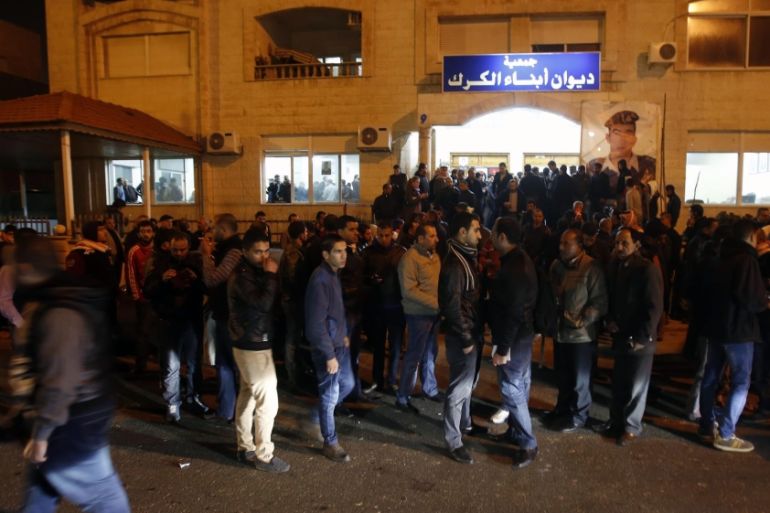Pilot’s brutal killing divides Jordanians over ISIL war
Jordan’s political divide over the war on ISIL is growing deeper.

Amman – As Jordan is weighing its options to respond to the brutal killing of pilot Moaz al-Kassasbeh who was burnt alive by the Islamic State of Iraq and the Levant (ISIL), the Jordanian public has become increasingly divided over the country’s continued participation in the anti-ISIL coalition.
On Tuesday night as mourners gathered in the capital Amman and Kassasbeh’s home province of Karak following the news of the pilot’s death, protesters clashed over Jordan’s role in what they say is an increasingly costly war.
Keep reading
list of 4 itemsMoscow theatre attack suspects show signs of beating in court
Four men showing signs of severe beating charged over Moscow concert attack
Russia mourns Moscow concert hall attack victims as death toll rises to 137
“We have no business in the coalition, it is the US [leading it],” said one of the mourners. His comments triggered clashes among the crowd. “We do not fear death or terrorists and we stand by the monarchy,” added another.
King Abdullah II cut short his visit to the White House in the US and called for unity through a televised speech. “It is the duty of every Jordanian man and woman to stand together and show the mettle of the Jordanian people during hardships, which only make us stronger,” the king said in a televised address to the nation.
OPINION: Jordan’s pilot murder and the banality of evil
It is the duty of every Jordanian man and woman to stand together and show the mettle of the Jordanian people during hardships, which only make us stronger.
“Jordan must execute her, burn her the way he was burned,” Mariam Matarneh, a relative of Kassasbeh and a member of their umbrella Bararsheh tribe, said.
Jordan said it was willing to free Rishawi, who has been on death row since 2006, in return for the Jordanian pilot. But the government had requested evidence that he was still alive before her release.
In Karak, angry protesters set fire to a government building immediately after his death, according to eyewitnesses.
On Wednesday, Jordan executed Rishawi and Ziad al-Karbouli, another al-Qaeda-linked prisoner, the state news agency, Petra reported.
This, however, did not soothe tensions over the pilot’s death. Saeed al-Daleen, a family spokesperson and relative of the pilot, said their issue was not with Rishawi but rather with the Jordanian government that is “sending our children to fight somebody else’s war”.
“We love Jordan and will fight to defend each centimetre if the country is under attack,” Daleen said, condemning recent comments by government officials that “soldiers are potential martyrs”.
An hour after the video surfaced, the Jordanian Armed Forces condemned the killing in a statement and vowed that the pilot’s “blood will not be shed in vain”.
|
|
Some Jordanians believe the war on ISIL is one they should fight to defend the image of Islam and save the lives of civilians.
“ISIL has attacked our religion and destroyed its image,” said Hareth Mahadeen, another mourner.
“Even if ISIL did not attack Jordan, I think we should fight it for the sake of our Iraqi and Syrian brothers – Muslim and Christians – who suffered at its hand.”
Hassan Abu Hanniah, a Jordanian political analyst, told Al Jazeera that ISIL has used the pilot’s hostage crisis “until the last minute” to make people pressure their government to withdraw from the coalition.
“If they do not succeed [at making Jordan withdraw], at least they are deepening the division that is already existing among the public over the war,” Abu Hanniah told Al Jazeera.
But since almost every Jordanian family has a member in the army, many were deeply concerned over the fate of their children.
“We will not be giving them [ISIL] our children anymore. The US is responsible for terrorism in the region and they should fight it, not us,” Matarneh, who has sons and brothers in the army, told Al Jazeera.